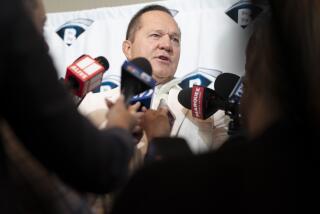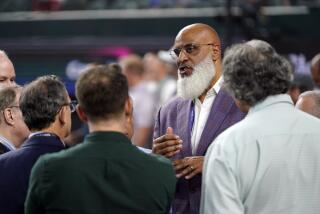Living Too Fast, Dying Too Young
- Share via
Dan Snyder is dead and Dany Heatley’s life will never be the same, all because Heatley, with the false sense of immortality that is a gift and a curse to rich young athletes, drove his Ferrari too fast and into a brick wall on an Atlanta street.
Snyder probably would have played on the Atlanta Thrashers’ third or fourth line after he’d recovered from ankle surgery. He was a hard worker, known for perseverance rather than skill. Heatley was a superstar on the rise, skillful and charismatic.
Their paths tragically entwined Sept. 29 when Heatley, driving 80 mph in a residential area, lost control of his high-performance car and veered off the road and into a wall outside an apartment complex. Snyder, a passenger in the car, suffered a fractured skull and severe brain injuries. He died Sunday night without emerging from a coma.
Heatley’s shoulder is banged-up, his jaw is broken -- he had surgery Saturday -- and he faces major knee surgery, but he’s alive.
Heatley on Monday was charged with vehicular homicide in the first degree, which carries a sentence of three to 15 years. He has posted a $50,000 bond and remains at an Atlanta hospital awaiting knee surgery. The Fulton County district attorney’s office is awaiting results of a toxicology test before taking the case to a grand jury. Heatley was initially charged with one felony and three misdemeanors.
No matter the outcome, he’ll have to live with knowing his carelessness caused the death of someone’s son, someone’s brother, someone’s boyfriend.
Heatley isn’t the only athlete who had more money than he probably ever imagined and bought a sports car with more horsepower than he’d ever need. Nor is he alone in ignoring the speed limit. The difference is, he wasn’t driving on a freeway with room to maneuver or barriers to absorb the impact of a crash. Racetracks and closed courses are built for fast cars. City streets aren’t, and he’s paying a horrible price for the thrill of a few seconds’ speed.
By all accounts, Heatley is a nice kid. He paid his brother’s college tuition and bought his parents new furniture with his first paycheck. But because he was reckless, his teammate is dead and his own career might be ruined. If that doesn’t provoke thought and promote caution the next time an athlete slides a key into the ignition, nothing ever will.
Then There’s the Elephant
Mario Lemieux is 18 goals from becoming the seventh NHL player to score 700. Al MacInnis, Mark Messier and Ron Francis are nearing the ends of illustrious careers. The Kings’ Dustin Brown, Carolina’s Eric Staal and Pittsburgh’s Marc-Andre Fleury are just beginning their careers.
Many stories will unfold when the NHL’s 87th season begins Wednesday, but they will be dwarfed by the elephant camped at center ice: the threat of no season after the collective bargaining agreement ends in September.
The first serious talks last week in Toronto produced no movement.
Bob Goodenow, executive director of the NHL Players Assn., said “everything we heard was related to an NFL-style hard cap,” which players oppose.
NHL counsel Bill Daly said a cap “was not even mentioned in the context of the meeting.... I’m starting to think that may have been part of a broader [NHLPA] public relations strategy. In that case I’m disappointed and I don’t expect we’ll have meaningful sessions in the future.”
Goodenow on Monday stood by his previous statement.
“There is absolutely no doubt that at last week’s session the NHL put forward a hard-cap system for players, and for Bill Daly and the league to suggest otherwise is a mischaracterization,” Goodenow said.
Daly also disputed past NHLPA claims that clubs have provided incomplete financial data to make their straits appear dire.
“I have pretty frequent contact with Ted Saskin [the NHLPA’s senior director] and pretty soon I’ll have a better idea if they want to move forward or if it was just a grandstand move,” Daly said.
Lemieux, unique as a player-owner, said he would join talks if asked. An impasse “would be very difficult for the league and for the players as well,” he said. “That’s why there’s plenty of time to sit down now and try to rack up a deal here in the next few months for the good of the game, to keep hockey on the uprise, and hopefully both sides realize there’s a lot at stake.”
Veteran Detroit forward Brendan Shanahan said last week he was “not a big fan” of the NFL labor deal.
“This is about one thing,” he said. “We are not going to get anything. Nothing is coming our way in this next negotiation. It’s how much are we willing to give back? “I think we are willing to give some back, but it has to be a compromise. I think if either side goes into this thinking that there’s going to be a 100% winner and a 100% loser, we are not going to get it done.”
Inaction, Not in Action
Restricted free agents Marian Gaborik and Pascal Dupuis of Minnesota and Martin Havlat of Ottawa are unsigned. Goalie Marc-Andre Fleury, the top pick in the June entry draft, walked out of Pittsburgh’s training camp -- and his digs in Lemieux’s home -- before signing an entry-level contract just before Monday’s noon deadline.
What do they have in common? All are represented by agent Allan Walsh of the Beverly Hills Sports Council.
“The stars happened to be aligned like that right now,” he said of the unsigned trio. “Part of it is that I have a lot of young players, and Gaborik, Havlat and Dupuis are in the situation where they’ve finished their first entry-level contract and they’re two years from arbitration and all are at the mercy of the clubs.
“If they were eligible for arbitration, you’d file and negotiate up to the hearing and then that would be it, one way or the other. Unfortunately, the way the [collective bargaining agreement] is structured, these players have absolutely no leverage for the two years after the entry-level contract is over. Why should Pascal Dupuis again be the lowest-paid player in the NHL when the Wild made $20 million last year?”
Walsh said the sides “aren’t even close” on Gaborik, who went home to Slovakia.
For Dupuis, who scored 20 goals last season for the light-scoring Wild and was the NHL’s lowest-paid player at $350,000, Walsh wants a deal similar to that signed by Tampa Bay’s Ruslan Fedotenko after a 16-goal season. Fedotenko will earn $950,000 this season. Walsh also used as a comparison Ladislav Nagy of Phoenix, who scored 23 goals in 2001-02 and will earn $1 million this season.
The Wild needs Gaborik and Dupuis, but the NHL is urging clubs to hold the fiscal line. Gaborik, Dupuis and Havlat want to be paid what they believe they’re worth. There are no easy answers, just a sense that everyone loses, at least for now.
Slap Shots
If David Aebischer can’t handle the goaltending duties in Colorado, the Avalanche might look at Tampa Bay’s Nikolai Khabibulin. He had a rocky playoff performance and could be traded if he has a slow start.
Curtis Joseph, squeezed out of the picture in Detroit when Dominik Hasek ended a one-year retirement, met Hasek last week after a practice. Joseph missed most of training camp while recovering from ankle surgery. The goalies shook hands and chatted briefly. Joseph is still on Detroit’s payroll for $8 million this season and next.
Devil goalie Martin Brodeur is writing a column that appears each Tuesday in Le Journal de Montreal. He isn’t battling writer’s block -- he conveys ideas to a reporter who turns it into prose -- but it’s an interesting concept. If he has a bad game, will he refuse to speak to himself? Should he wait outside the Devils’ locker room for 10 minutes after each game to interview himself, with the rest of the media pack?
The Edmonton Oilers will retire Grant Fuhr’s jersey at their home opener Thursday.
The Penguins’ ownership committee voted to increase Lemieux’s compensation. His salary will be $5.25 million for the third straight season, but his pay as chief executive was bumped up to $2.25 million and he was awarded $2.5 million in deferred compensation. He got little of the $32 million the Penguins owed him when they filed for bankruptcy in 1999, taking most as equity in the team.
More to Read
Go beyond the scoreboard
Get the latest on L.A.'s teams in the daily Sports Report newsletter.
You may occasionally receive promotional content from the Los Angeles Times.











